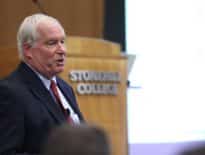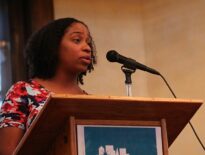
Gov. Charlie Baker takes questions from the media at Mill City BBQ and Brew in Lowell, Sept. 23. Photo by Craig F. Walker | Boston Globe Staff/Pool
Gov. Charlie Baker has signaled he won’t extend the state’s eviction ban a second time past its Oct. 17 expiration date.
Speaking at a press conference in Lowell Tuesday, Baker said his administration is trying to put together a plan, in conjunction with the state’s court system, to address what advocates on both sides of the issue warn will likely be a large and sudden spike in evictions as landlords with out of work tenants look to replace them with ones who can pay rent.
“We’d really like to see if we can put a plan together to do with the courts what needs to be done to make sure people are protected with regards to their housing,” he said, “but the longer the thing goes on the deeper the hole gets – not just for tenants but for landlords, especially small landlords who have, In many cases run out of rope.”
State leaders are under pressure from a federal judge’s Sept. 10 ruling that let the freeze stand, but warned it could become unconstitutional if it stayed in place in the longer term as the COVID-19 pandemic’s early days recede into the rear-view mirror.
Baker said discussions with the courts on a possible solution were upended by Chief Justice Ralph Gants’ sudden death on Sept. 14 following a Sept. 4 heart attack.
But even if Baker ends the state’s eviction moratorium, it’s unclear if evictions will be able to commence until January, following a national eviction freeze imposed by the Centers for Disease Control.
Baker’s comments come as The Boston Foundation and the Dukakis Center at Northeastern University issued a report warning the state’s housing system “threatens to collapse under the large and unanticipated shock to household incomes” from the pandemic-induced recession.
The researchers found that job losses have hit hardest in Black and Latino households where the wage earners were between 25 and 34 years old and making less than $400 per week prior to becoming unemployed. The state’s Gateway Cities like Lawrence, Brockton and Holyoke have suffered disproportionate numbers of job losses, with unemployment there ranging from 23 to 31 percent compared to Boston’s 15.5 percent rate.
To prevent a market collapse, researchers urged officials to create programs to mediate landlord-tenant disputes and encourage landlords to accept partial rent payments. Expanding the state’s earned income tax credit could help more renters pay at least partial rent until the economy recovers, they suggested.
“With limited public resources and a weakening rental market, it’s simply not feasible to expect that landlords will be paid in full,” researchers wrote.




 |
| 

